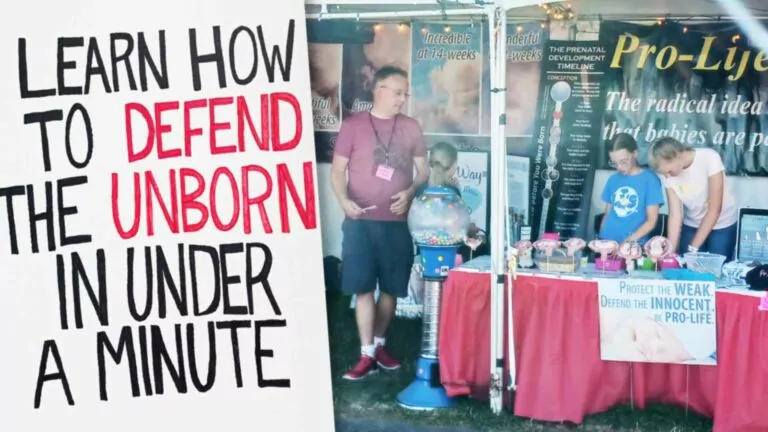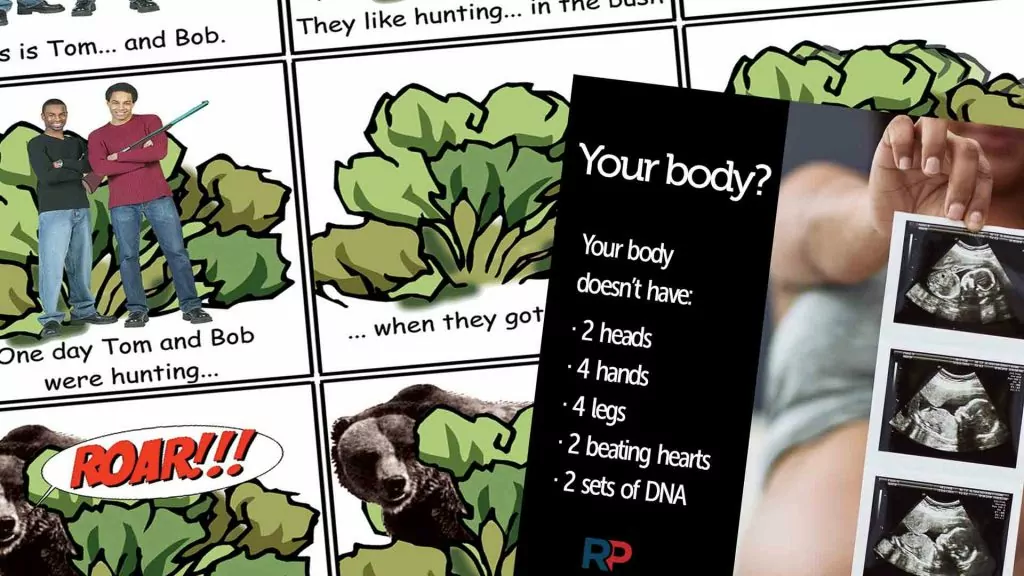I live in a town that’s so pro-life that when I go outside wearing a pro-life t-shirt the only reaction I get is, “Hey Jon, great-looking shirt there. Does it come in red?”
We’re so pro-life that when pro-abortion politicians marched in this year’s Farmer’s Day Parade, there was all sorts of cheering and clapping for the float in front of them and the marching band behind them, but not a peep anywhere near them. They were enveloped in an angry bubble of silence.
Our town is so pro-life that when my daughters and I volunteer at the pro-life booth, we can count on thanks, not shouts. The booth is set up at the summer fair each year, and most everyone stopping by is there to offer encouragement. They bring their kids to get free pro-life lollipops and pencils. Some buy yard signs or hats. The most popular items are our life-size fetal models showing what the unborn look like at 6 months, and 4 months, and 12 weeks; it’s always fun when a pregnant mom comes by to show her kids what size their baby brother or sister is right now.
In the half dozen years we’ve been at this, I’ve only had a dozen or so folk either insult or argue with me. This, then, is more about preaching to the choir than reaching the opposition.
Equipping the choir
That’s why this year I decided to switch things up a bit. If it was always the choir stopping by, then what if we focused on equipping them? What if we tried to give them a quick “Pro-life 101” refresher, so they could walk away better able to speak up for the unborn?
Of course, everyone at the fair is there for the rides and the food and the demolition derby, so it isn’t really the time and place for a class in apologetics. If I was going to pitch something educational, it needed to be quick. My daughters helped me out with a big poster that made an even bigger promise:
“Learn how to defend the unborn in under a minute!”
The sign was eye-catching and, thankfully, ambiguous enough to give me a little wiggle room on the time limit. Was I promising passersby a 59-second lesson or was I going to show them – in perhaps a slightly longer length of time – how they themselves could offer up a sub-minute defense of the unborn? The fudge factor allowed me to go a little long if I needed it.
The short version
A lightning-quick defense of the unborn is possible because most abortion arguments focus on one thing: what the unborn can’t do. The fetus is said to be less valuable and less deserving of protection than you or me because:
- they can’t breathe yet
- they don’t have brainwaves yet
- they aren’t self-aware yet
- they can’t survive on their own
Whatever the reason given, it amounts to an abilities test – the unborn are said to be worth less, because they can do less.
Therefore to defend the unborn all we have to do is show how it isn’t our abilities that give us value. We can do that by asking a couple of key questions. We’ll need our opponents to explain:
- Where does human beings’ worth come from?
- On what basis are we all equal?
Unpacking the argument
If our value comes from what we can do then that presents a problem for equality, since we all have very different abilities. I’m bigger than most, and maybe you’re faster than me, and that fellow over there might be smarter than both of us. So, then, in what sense are any of us equal? It’s quite the conundrum for the abortion supporter. Any ability-based answers he gives to the first question will run him into problems with the second.
After all, we all understand that we don’t treat very different things as equal – a Rembrandt is housed in a museum under guard, while a child’s fingerpainting will only rate the fridge door, even though both are art. So unless men and women are actually equal in some sense, then we shouldn’t treat them as equal. That’s a thought no one wants to think, so we can be aggressive in pressing the abortion defender to explain how we’re equal.
When he’s fumbling about, it’s our chance and our turn: “You can’t explain where equality comes from, but I can.”
We can explain that what makes us all valuable, and equally so, is the only thing we all equally share: that we are made in the very Image of God (see Gen. 1:27). Being made in the Image of God isn’t something we grow into, or get more of, and it isn’t even something we can cast off (Gen. 9:6). We have it, not on the basis of anything we can do, might do, or should do, but on the basis of Who made us, and how He values us. This is not only an explanation for why a small weaker woman is equal to a stronger bigger man, but why the very small and very weak unborn child is equal to any and all.
Stand on God’s Word
While our opponent might dismiss the Bible, that doesn’t make it any less powerful (Heb. 4:12, Eph. 6:17). And we can counter their dismissal by challenging them to offer any sort of better explanation. They don’t have one!
More importantly, when God says His Word won’t return empty we need to trust that it’s so (Is. 55:11). Too often, Christians will try to defend the Christian position without presenting it as the Christian position. If our opponents are attacking the unborn for what they can’t do, then we’ll try to defend the unborn with an equally godless argument, highlighting all that they can do. Instead of arguments about being made in the Image of God, we’ll show how very much the unborn seem to be crafted in the image of Man:
- The unborn’s heart is beating at three weeks
- Brainwaves can be detected at 40 days
- They may be able to survive outside the womb at 20 weeks
- They can recognize their mother’s voice at 7 months
The problem with any of these points is that, on their own and apart from the Bible, they are only another abilities test. We’re saying that the unborn are valuable because of all these things they can do. But that’s the pro-choice argument! If we argue that the unborn are valuable because their heart begins beating as early as three weeks, what does that implicitly say about the unborn at two weeks, before their heartbeat has begun? Any defense of the baby based on what it can do throws shade on babies who have yet to develop those abilities. We either stand securely on God’s Word, or we will, accidentally but most certainly, end up adopting the very position that we oppose: that our worth comes from what we can do.
Conclusion
I got to share my two-question apologetic with a dozen or so pro-life folk. I also got to try it out with a young man who wanted to argue. It slowly came out that the reason he thought we should all just mind our own business is because he’d gotten his girlfriend pregnant and paid for her abortion. So he was very interested in justifying what he’d done. He thought the baby wasn’t human because it was so small. But this man, little more than a boy himself, was half my size, which I pointed out. Did he really think bigger meant better? No, he conceded, that wasn’t true.
He didn’t repent. Or at least not then and there. But I was able to confront him with just how insufficient his justifications were. He left rejecting the Christian explanation for our value, but admitting that he had nothing else to offer.
That’s what I could do standing on God’s firm foundation; I could blow apart the underpinnings of his godless arguments. Because I did this while giving the glory to God, this confused and hurting boy will know where to go, and Who to turn to for truth and forgiveness. And all it took was a couple of questions and a minute… or so.












